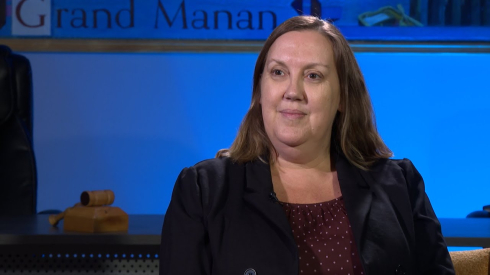- Mettre en route la vidéo
- Cliquer sur l’icône « CC » (Sous-titre) en bas à droite
- Cliquer sur l’icône « Settings » (Paramètre) en bas à droite
- Cliquer sur «Subtitles » (Sous-titres)
- Cliquer sur « Auto-translate » (Traduire automatiquement)
- Sélectionner la langue de votre choix
New Brunswick and the Last of the Right Whales
Filmmaker Nadine Pequeneza's "Last of the Right Whales" shines a light on the most endangered great whale on earth, the North Atlantic Right Whale. There are less than 400 North Atlantic right whales left on the planet, and they travel through the Bay of Fundy every year.
"It was the events of 2017 that inspired me to make this film," says Pequeneza. "There were a large number of whales--17 in total--that died that year, and 12 of them in canadian waters. When that news started coming out, it was in such a short space of time. It really got my attention finding out that those deaths are being caused by us--by ship strikes and fishing gear entangles. These whales don't normally die of a natural death anymore, and that's quite a statement if you stop to think about it. I don't think we want to be responsible for wiping out a great whale that's been on this planet for millions of years because of ignorance and an unwillingness to do anything."
Dr. Moira Brown, one of the lead scientists who has pioneered efforts to designate the Bay of Fundy a protected water space for the right whale, is one of the stars of Pequeneza's documentary. Dr. Brown spends a significant portion of her year working on Campobello Island. She works along the Campobello Island Whale Rescue Team to help untangle whales from fishing gear, and Pequeneza followed Brown and the team on one of these missions for the documentary.
"You couldn't make this film without her," says Pequeneza about Brown.
The film also highlights New Brunswick fishermen choosing to experiment with ropeless fishing, which is one of the most important industry initiative that could revolutionize the future of the fishing industry, protecting whales in the process. There is hope, which Pequeneza's film highlights, but it is also imperative that we act now.
Ajouter un commentaire
La télévision du comté de Charlotte est la seule source de télévision communautaire indépendante du Nouveau-Brunswick. Depuis 1993, CHCO-TV fournit au sud-ouest du Nouveau-Brunswick du contenu produit localement par la communauté qu'elle dessert.
La mission de CHCO-TV est de promouvoir les médias communautaires et d'encourager, d'éduquer et d'engager les résidents du sud-ouest du Nouveau-Brunswick, d'utiliser les nouveaux médias et la technologie, d'améliorer la participation civique, d'acquérir de nouvelles compétences médiatiques et d'améliorer la culture, l'économie, la santé et qualité de vie au Nouveau-Brunswick.











Commentaires
Nous encourageons les commentaires qui favorisent le dialogue sur les histoires que nous publions. Les commentaires seront modérés et publiés s'ils respectent ces lignes directrices:
Le portail des médias communautaires se réserve le droit de rejeter tout commentaire ne respectant pas ces normes minimales.